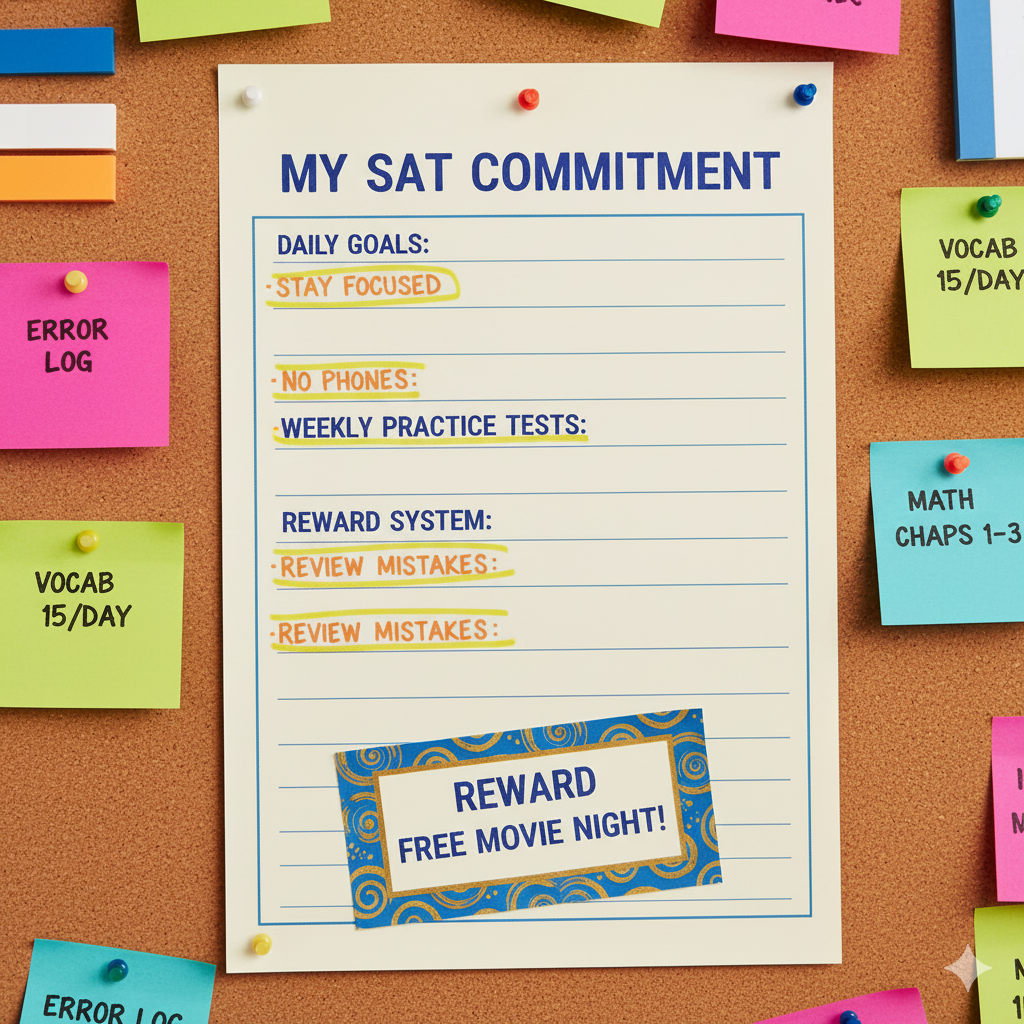Why a study contract matters — and why it works
If you’ve ever promised yourself you’d “study more” and then watched Netflix instead, you’re not alone. A study contract turns vague intentions into a clear, realistic agreement between you and — well — you. Especially for the Digital SAT, where practice and familiarity with the testing app and adaptive format matter as much as content knowledge, a contract helps you commit to a plan, measure progress, and adjust when life gets busy.
This isn’t about rigidity or pressure. A good contract is flexible, humane, and motivating. Think of it as your personalized blueprint: it says what you’ll do, when you’ll do it, how you’ll measure success, and what happens if things go off track. It also creates space for rewards, rest, and course corrections. That balance is what keeps momentum steady without burning you out.
Before you write anything down: three honest self-check questions
Take five minutes and answer these honestly — they’ll shape a contract you can actually keep.
- How much time can you realistically study each week? Be honest. If your schedule is loaded with sports, job shifts, or family duties, shorter consistent sessions beat sporadic marathon nights.
- What are your target colleges or scholarships — and what score do they typically expect? Your target score anchors your timing and daily workload.
- What are your strengths and weakest areas? (Evidence: past test scores, practice sections on Bluebook, or Khan Academy diagnostics.) That determines where your time should go.
Core elements of a strong SAT study contract
Every study contract should include a handful of non-negotiables. These make the agreement concrete and measurable.
- Goal score: a target overall score and section targets (Math, Reading & Writing).
- Timeline: test date and phases of preparation (diagnostic, skill-building, timed practice, final review).
- Weekly time commitment: total hours and how they’re split across days.
- Practice structure: how many full-length Bluebook practice tests, daily drills, and review sessions.
- Accountability: who you’ll tell (friend, parent, teacher), check-ins, or a study buddy; or a service like Sparkl’s personalized tutoring if you want 1-on-1 guidance, tailored study plans, and expert tutor check-ins.
- Consequences & rewards: what happens if you stick to the plan — and what you’ll change if you don’t.
Step-by-step: Write your contract
1. Header: The promise and the date
Start with a single sentence that sounds like you. Example: “I, Jamie Rivera, commit to preparing for the Digital SAT to reach a 1320 by March 14, 2026.” Put the date you start and the test date. This simple header makes the contract feel official — but not scary.
2. Specific goals: numbers and behaviors
Numbers matter, but so do behaviors. Combine them.
- Score goal: e.g., “Overall 1320; Math 700; Reading & Writing 620.”
- Behavioral goals: “Complete one adaptive Bluebook practice test every two weeks; complete four 45-minute targeted practice sessions per week; review errors for at least 30 minutes after each test.”
3. Weekly schedule: time + focus
Place study blocks into your week like appointments. Consistency beats intensity. The sample table below helps visualize a balanced schedule.
| Day | Session | Focus | Duration |
|---|---|---|---|
| Monday | Evening | Math skill drills (algebra & functions) | 45 min |
| Tuesday | Afternoon | Reading passage practice (timed) | 40 min |
| Wednesday | Evening | Writing & language exercises + error review | 45 min |
| Thursday | Afternoon | Mixed problem sets & vocabulary (short) | 30 min |
| Friday | Evening | Free review / catch-up | 30-45 min |
| Saturday | Morning | Bluebook full practice test (adaptive) | 2–2.5 hours |
| Sunday | Afternoon | Test review + rest | 60–90 min |
4. Tools and materials (what you’ll actually use)
List the specific resources so there’s no guesswork on Monday morning.
- Bluebook app for full-length adaptive practice tests
- Official SAT Practice on Khan Academy for targeted skill lessons and practice
- Note notebook or digital error log (Google Doc, Notion, or Excel)
- Time-blocked calendar (Google Calendar or a physical planner)
- Optional: Sparkl’s personalized tutoring if I want 1-on-1 guidance, tailored study plans, and AI-driven insights to accelerate weak areas.
5. Accountability & check-ins
Pick a cadence and a partner — even if the partner is an app or tutor. Try this mix:
- Daily: quick checklist (completed or not)
- Weekly: 15-minute review on Sunday to analyze errors and set next week’s focus
- Biweekly: share a practice test score with a trusted advisor (teacher, parent, or Sparkl tutor) and adjust the plan
Designing consequences that motivate (without crushing you)
Consequences work best when they’re meaningful and non-punitive. Pick two rewards and two mild penalties that reflect what you care about.
- Reward example: Hit weekly goals for four consecutive weeks → choose a weekend movie night out or a new pair of earbuds.
- Small penalty: Miss three planned study sessions in one week → donate $5 to a jar for a future treat (or do five extra 20-minute review sessions the next week).
- Accountability consequence: If I fall behind more than two weeks, schedule a session with an expert tutor (Sparkl’s personalized tutoring can step in for focused 1-on-1 help) to recalibrate.
Practical examples: three contract templates
Use whichever fits your timeline. Each template shows commitments for a student aiming to increase their score by ~150 points over 4 months.
Template A — The steady climber (best if you have 12+ weeks)
- Weekly total: 6–8 hours
- Full-length Bluebook: Every two weeks
- Focus split: 50% skill work, 50% timed practice & review
- Check-in: Weekly self-review + biweekly tutor review
Template B — The intensive boost (best if you have 6–8 weeks)
- Weekly total: 12–15 hours
- Full-length Bluebook: Weekly
- Focus split: 60% practice tests + review, 40% targeted drills
- Check-in: Weekly tutor or mentor check-in
Template C — The gentle refresher (best if you’re within 3–4 weeks of test)
- Weekly total: 8–10 hours
- Full-length Bluebook: One full test + two timed sections
- Focus split: 70% error review & pacing practice, 30% light practice
- Check-in: Daily mini-checklist + one final full-review session with a tutor if needed
How to log progress: a simple error-tracking system
Keeping an error log is the single highest-leverage habit students miss. After every practice session write down:
- Question type (e.g., linear equations, vocab-in-context, hypothesis in reading)
- Why you missed it (content gap, careless, or pacing)
- How you’ll fix it (watch a Khan Academy video, redo 5 similar problems, slow down by 30 seconds)
Here’s a one-week example of how a short log might look in a spreadsheet or notebook:
| Date | Question Type | Reason | Fix |
|---|---|---|---|
| 2025-01-10 | Algebra: linear systems | Forgot substitution steps | Redo 10 substitution problems; review method video |
| 2025-01-12 | Reading: inference | Rushed; missed key sentence | Practice slower read + underline main idea |
| 2025-01-15 | Writing: comma usage | Uncertain about independent clauses | Complete 20 targeted grammar items |
 Make the contract flexible — and revisable
Make the contract flexible — and revisable
Life happens. A good contract includes checkpoints to revise. Add a clause: “If I miss 25% of scheduled sessions in any two-week span, I will reassess and adjust goals with a mentor or tutor.” That keeps you accountable without punishing minor life disruptions.
Accountability methods that actually work
Different students respond to different pressures. Try one or two of these methods and keep what helps you:
- Public commitment: Tell one or two people and ask them to text you a weekly check-in.
- Study buddy: Partner with a friend and swap weekly practice-test evidence.
- Micro-commitments: Use a habit tracker app that shows streaks — broken streaks are powerful motivators.
- Tutor oversight: Book monthly review sessions. If you prefer structured, expert feedback, Sparkl’s personalized tutoring offers tailored study plans, expert tutors, and AI-driven insights to speed up improvement.

Test-day and pre-test clauses to add to the contract
Include practical, calming details so you reduce friction on test day:
- Device preparation: “Install Bluebook and complete setup by two weeks before the test.”
- Logistics: “Pack admission ticket, valid ID, snacks for after the test, and a fully charged laptop/tablet charger.”
- Sleep & nutrition: “For 3 nights before the test, aim for 8 hours of sleep and balanced meals.”
- Mental reset: “The day before the test is for light review only: a 45-minute final walkthrough of error logs and a calming 20-minute break.”
Common pitfalls — and how the contract prevents them
Here’s how a contract guards against the usual traps:
- Procrastination: By scheduling specific times and adding accountability, you turn vague plans into appointments you must keep.
- Overstudy or burnout: The contract forces planned rest and realistic weekly hour caps.
- Random practice: The contract clarifies which skills to target, so practice is efficient.
- Ignoring adaptive format: Including Bluebook practice in your contract ensures you experience adaptive timing and tools before test day.
Sample one-page contract you can copy
Paste this into a document and fill in your details.
| Item | My Plan |
|---|---|
| Student | [Your Name] |
| Start Date | [MM/DD/YYYY] |
| Test Date | [MM/DD/YYYY] |
| Target Score | [Overall / Section Targets] |
| Weekly Commitment | [# hours] — Days and times: [e.g., Mon 7–8pm, Sat 9–11:30am] |
| Practice Plan | [Bluebook frequency, Khan Academy lessons, error log habit] |
| Accountability | [Name of person or tutor, check-in schedule] |
| Reward | [e.g., concert ticket when I hit target] |
| Penalty | [e.g., extra practice sessions or small fine to savings jar] |
When to get extra help — and what to expect
Even the best contracts sometimes hit roadblocks: stubborn content gaps, plateauing practice scores, or test anxiety. That’s the moment to bring in targeted help. If you choose tutoring, look for:
- Diagnostic-first approach: A tutor should analyze your Bluebook test, error log, and pacing, not just give generic worksheets.
- Personalized plan: Your tutor should tailor lessons to your weakest areas and align with your contract timeline.
- Regular checkpoints: Biweekly score review and practice-test debriefs.
Sparkl’s personalized tutoring blends 1-on-1 guidance, tailored study plans, and AI-driven insights that can be slotted into your contract for accountability and expertise exactly when you need it.
Final tips — keep it kind, clear, and curious
Here are quick habits to make the contract live beyond the first week:
- Make it visible: Put the one-page contract on your desk or phone wallpaper.
- Celebrate small wins: Log improvements in accuracy or timing as victories.
- Review with curiosity: When you miss a goal, ask “Why?” three times to find a real solution.
- Adjust as you learn: A contract isn’t set in stone. It should evolve as your scores and life change.
Closing: A little personal encouragement
Creating a study contract is an act of self-respect. It tells your future self: I planned for you. You can make the plan feel personal and even a little fun. Whether you’re aiming for a modest bump or a dramatic leap, the combination of clear goals, steady practice, honest review, and thoughtful accountability will get you closer — usually faster than random studying does.
If you ever feel stuck, remember help is available — from teachers, counselors, a study buddy, or targeted tutoring that fits into the contract. A short, guided session can rewire your study plan in a single afternoon. Keep it realistic, keep it kind, and most of all, keep going. You’ve got this.

















No Comments
Leave a comment Cancel